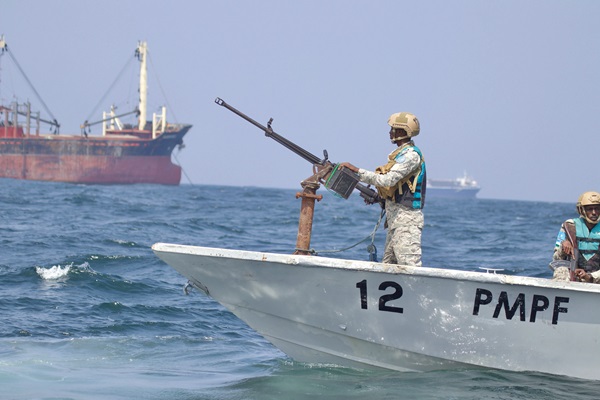
- Summary
- Concerns this marks first big pirate attack since 2017
- Red Sea already plagued by surge in attacks on ships
- Gangs could be ‘jumping on bandwagon’ of Houthi assaults
- Somali government sees only ‘standalone occurrences’
LONDON/MADRID/MOGASISHU, Dec 19 (Reuters) – A merchant ship sailing off Somalia has been hijacked by unknown raiders, Spain’s defence ministry said on Tuesday, fuelling fears pirates are returning to the Gulf of Aden and Red Sea waters already plagued by a surge in attacks on shipping.
A Spanish warship rushed to check on the Maltese-flagged vessel Ruen on Friday after reports it had been hijacked. It “has been under piracy (control) since the morning of Dec. 14,” the ministry said in a statement, in its first confirmation of the ship’s fate.
“The MV Ruen has indeed been hijacked. With regard to the questions on who the hijackers are, the planned boarding of the vessel … we do not have that information,” the ministry added in an emailed response.
Some maritime security sources said their assessment was that the incident was the first hijacking of a merchant ship by Somali pirates since 2017.
Pirates who caused chaos in the key waterways from 2008 to 2018, may have returned, possibly encouraged by a relaxation of security, or taking advantage of the chaos caused by attacks on shipping by Yemen’s Iran-aligned Houthi group amid the war in Gaza.
“They clearly think they have a permissive environment ashore and success begets success,” said Gerry Northwood, a former captain who commanded warships in the region with Britain’s Royal Navy.
“Add to which naval patrols are thin on the ground and security on ships is almost non-existent,” said Northwood, a consultant with maritime security company MAST.
‘JUMPING ON THE BANDWAGON’
Somali authorities said they had got on top of piracy in Somali waters in 2019.
The “effective establishment of governance” by Somalia’s federal government, had eliminated areas where pirates could operate freely, Ali Mohamed Omar, Somalia’s State Minister of Foreign Affairs and International Cooperation, told Reuters.
“The current incidents are being scrutinized as standalone occurrences. One of the potential reasons being explored is the crisis in the Red Sea, which we call for a diplomatic resolution (as the) best course of action,” Omar said.
A senior European diplomat said the uptick in Somali piracy at the same time as the Houthi attacks on shipping might not be a coincidence, adding that in a lawless area where mercenaries abound, allegiances were shifting.
Northwood said the assumption was that Somali gangs were “jumping on the band wagon”.
“Also Somali investors have always been careful to disassociate themselves from terrorism/state activity. (It’s been) criminal not political.”
In January, the shipping industry removed its designation for the Indian Ocean high risk area, a specific stretch of waterway, due to efforts to combat Somali piracy for more than a decade.
“Right now we don’t see this as a resurgence of piracy. The Ruen is an isolated incident at this point and was most likely targeted by who we don’t know as yet,” said Corey Ranslem, chief executive of British maritime risk advisory and security company Dryad Global.
The London marine insurance market’s Joint War Committee on Monday maintained its separate high risk list for waters around Somalia “after reports of missiles and the definite hijacking of MV Ruen”.
Reporting by Jonathan Saul in London, Emma Pinedo and Aislinn Lang in Madrid, Abdi Sheikh in Mogadishu; Editing by Andrew Heavens
______________________________________________________________________
Sources: Reuters
_______________________________________________________________________
Xafiiska Wararka Qaranimo Online | Mogadishu, Somalia
_____________________________________________________________________________________Xafiiska Wararka Qaranimo Online | Mogadishu, Somalia
_____________________________________________________________________________________Advertisement
_____________________________________________________________________________________







